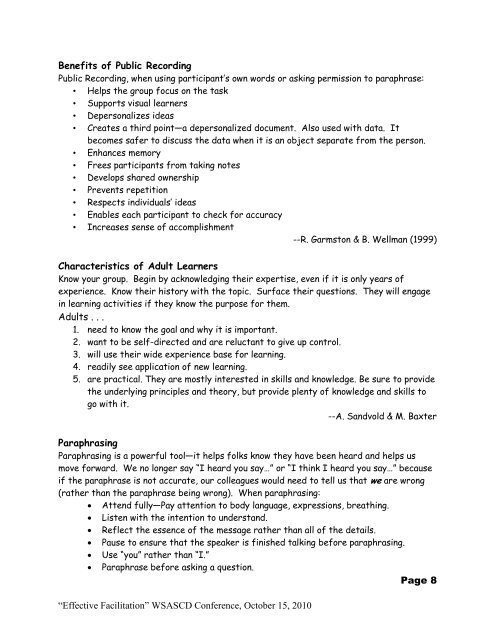3hPlSq
3hPlSq
3hPlSq
Create successful ePaper yourself
Turn your PDF publications into a flip-book with our unique Google optimized e-Paper software.
Benefits of Public Recording<br />
Public Recording, when using participant’s own words or asking permission to paraphrase:<br />
• Helps the group focus on the task<br />
• Supports visual learners<br />
• Depersonalizes ideas<br />
• Creates a third point—a depersonalized document. Also used with data. It<br />
becomes safer to discuss the data when it is an object separate from the person.<br />
• Enhances memory<br />
• Frees participants from taking notes<br />
• Develops shared ownership<br />
• Prevents repetition<br />
• Respects individuals’ ideas<br />
• Enables each participant to check for accuracy<br />
• Increases sense of accomplishment<br />
--R. Garmston & B. Wellman (1999)<br />
Characteristics of Adult Learners<br />
Know your group. Begin by acknowledging their expertise, even if it is only years of<br />
experience. Know their history with the topic. Surface their questions. They will engage<br />
in learning activities if they know the purpose for them.<br />
Adults . . .<br />
1. need to know the goal and why it is important.<br />
2. want to be self-directed and are reluctant to give up control.<br />
3. will use their wide experience base for learning.<br />
4. readily see application of new learning.<br />
5. are practical. They are mostly interested in skills and knowledge. Be sure to provide<br />
the underlying principles and theory, but provide plenty of knowledge and skills to<br />
go with it.<br />
--A. Sandvold & M. Baxter<br />
Paraphrasing<br />
Paraphrasing is a powerful tool—it helps folks know they have been heard and helps us<br />
move forward. We no longer say ―I heard you say…‖ or ―I think I heard you say…‖ because<br />
if the paraphrase is not accurate, our colleagues would need to tell us that we are wrong<br />
(rather than the paraphrase being wrong). When paraphrasing:<br />
Attend fully—Pay attention to body language, expressions, breathing.<br />
Listen with the intention to understand.<br />
Reflect the essence of the message rather than all of the details.<br />
Pause to ensure that the speaker is finished talking before paraphrasing.<br />
Use ―you‖ rather than ―I.‖<br />
Paraphrase before asking a question.<br />
Page 8<br />
“Effective Facilitation” WSASCD Conference, October 15, 2010


